Post
A catch
Save a catch to start your fishing logbook. You will be able to to share it with the community if yo want!
A fishing trip
Post an ad to go fishing with other fishermen
Save a catch to start your fishing logbook. You will be able to to share it with the community if yo want!
Post an ad to go fishing with other fishermen
Share a thought, a question with the community
My favorite cities
×Join our 233 fishermen and our 2 cofishermen in Dalestie in Moray. The fishing forecast is currently 3.5. The most caught fishes here are the strerlet fish , the wels catfish, the silver bream and the eel fish. Come try the most famous fishing techniques like the fishing sea bream with soft lures, scrapped fishing, lead techniques for soft lures to fish bass or cast fishing with dough.
Our fishing forecast of Dalestie indicates the best time to go fishing in this city.
The Strerlet fish
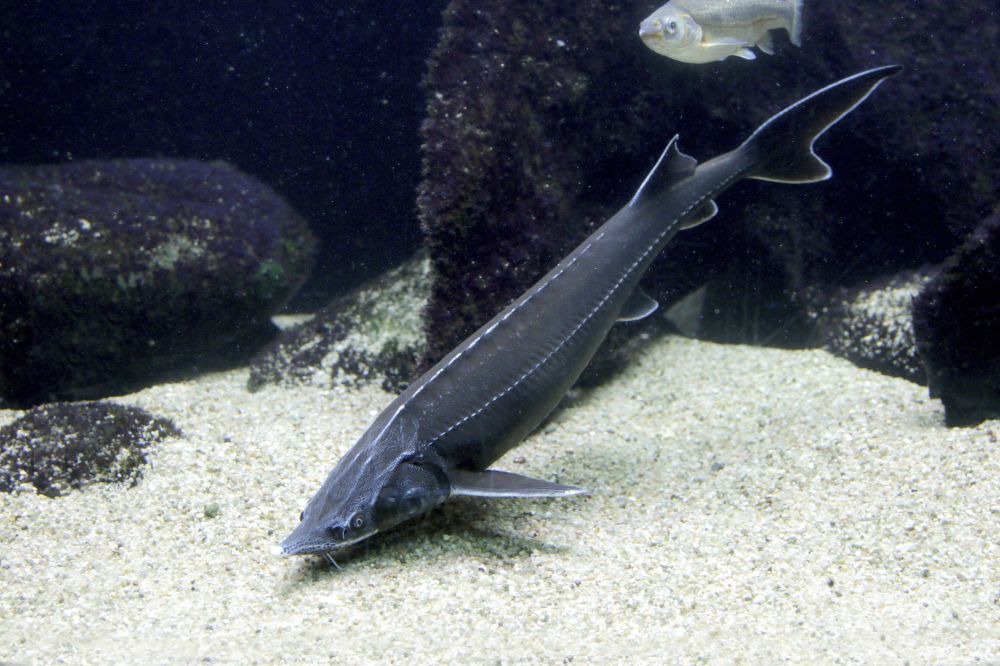
The Sterlet fish belongs to the Acipenseridae family. The Sterlet fish measures about 3.50m in length and weighs 300kg. It can live a hundred years. Females lay more than 800,000 eggs on the gravel. Spawning season is around May to June. It can be fished all year round. The back and sides are grey to beige, the ventral and lateral parts are lighter (almost white). Five longitudinal rows of large bone plates are arranged along the body. The upper lobe of the caudal fin is more developed than the lower lobe. The muzzle is narrow, pointed and raised upwards with four long fringed barbells. The lower lip is notched in the middle. The Sterlet fish has a protractile mouth placed on the underside of the head.
The Strerlet fish is a famous fish you can catch in Dalestie.The Wels Catfish
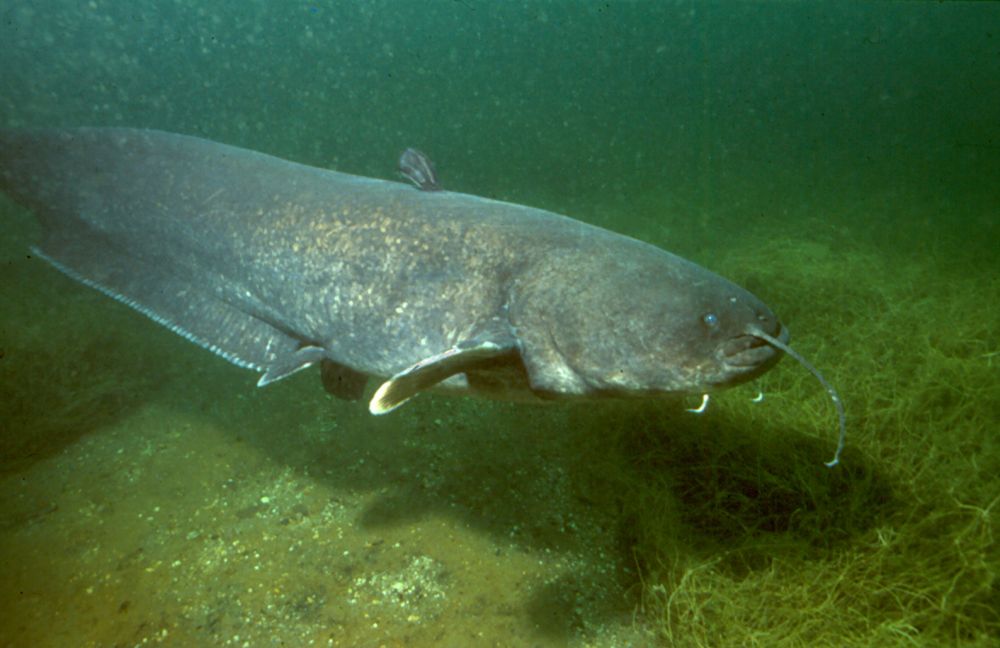
The Wels Catfish belongs to the Siluridae family. The usual size is 1 m for 10 kg but it can reach a maximum of about 5 m for a weight of about 300 kg. The maximum observed longevity is 60 years. It breeds from May to June. The female lays 20,000 to 30,000 eggs per kg of weight. It can be fished all year round. This massive species has a flat, broad head with small eyes and three pairs of barbells. Two pairs not movable on the lower jaw, one longer and movable on the upper jaw. The trunk represents about 1/3 of the animal and has the paired radiated fins and a small rudimentary dorsal fin. The belly is lighter. The posterior part of the body is laterally flattened and has a long anal fin. The tail ends in a homoceric fan-shaped caudal fin. The livery is variable and fluctuates from olive green to grey, both plain and with light spots. The skin is viscous and flake-free. The wels catfish has many small teeth.
The Wels Catfish is a famous fish you can catch in Dalestie.The Silver Bream
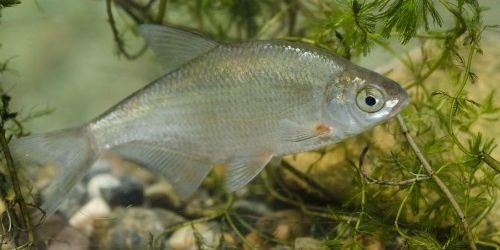
The Silver bream belongs to the Cyprinidae family. The usual size of the Silver bream is 20 to 30 cm and weighs about 200 g. The largest specimens can reach 35 cm. The life span of the Silver bream is about 10 years and it breeds from May to July. The female lays 20,000 to 60,000 eggs. It can be fished all year round. The Silver bream (Blicca bjoerkna) has a high, laterally flattened body, with a bushy back, characteristic of breams and accentuating with age. The head of this bream is small in relation to the size of its body but its eye is quite large, compared to its common cousin. Its snout is short and its mouth is oblique downwards, a characteristic common to fish seeking food on the bottom. The mouth is protractile (it unfolds forward) and free of barbells, surrounded by thick lips. The Silver bream is characterized by a long anal fin with between 22 and 26 rays, although shorter than the fresh water bream (26 to 30 rays). The dorsal fin of the Silver bream is short and high. The caudal fin is strongly indented. The Silver bream has a silvery coloring on the sides and belly, with a dark greyish-green or olive-colored back. The pelvic, pectoral and anal fins have an orange-red color. This last coloring can affect the whole stomach in older Silver breams.
The Silver Bream is a famous fish you can catch in Dalestie.The Eel fish
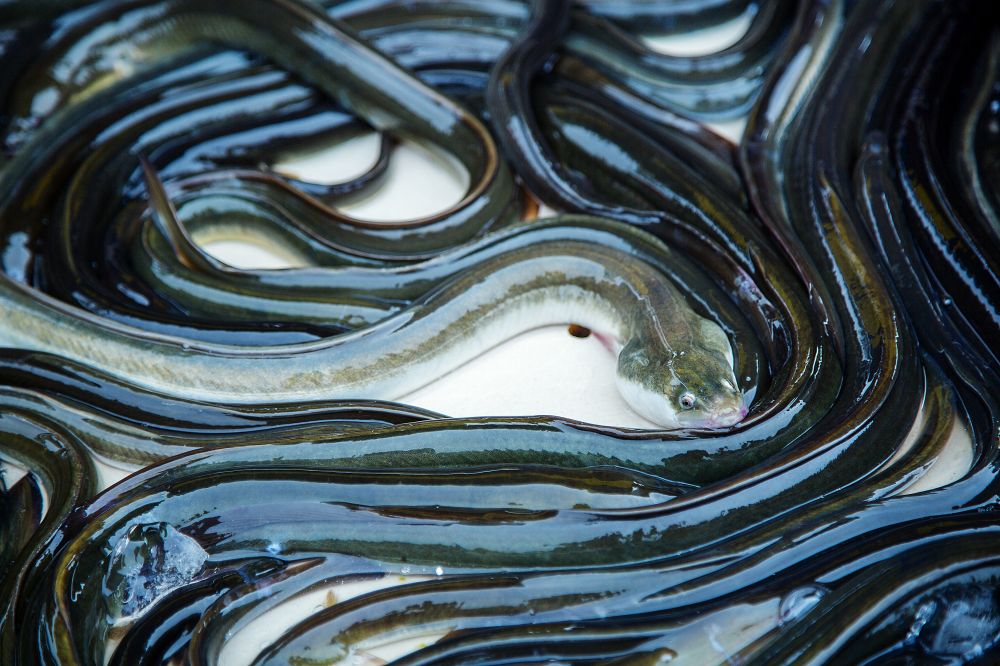
The Eel fish belongs to the Anguillidae family. The eel can measure up to 1.50 m in length for 4 kg, but the average size is between 40 and 60 cm. They can live up to 50 years old. They reproduce in March. They can be fished from April to September. The eel is a species of snake fish, hence its Latin name "anguis" which means snake. Its anterior part is circular while the caudal section is flattened. Its body is covered with smooth skin and enriched with mucus. The scales only appear late. The eyes of an eel are round. It has a terminal mouth with a prominent jaw. Without pelvic fins, the eel has only small pectoral fins and long dorsal, anal and caudal fins. These meet at the level of the tail.
The Eel fish is a famous fish you can catch in Dalestie.The Largemouth black bass
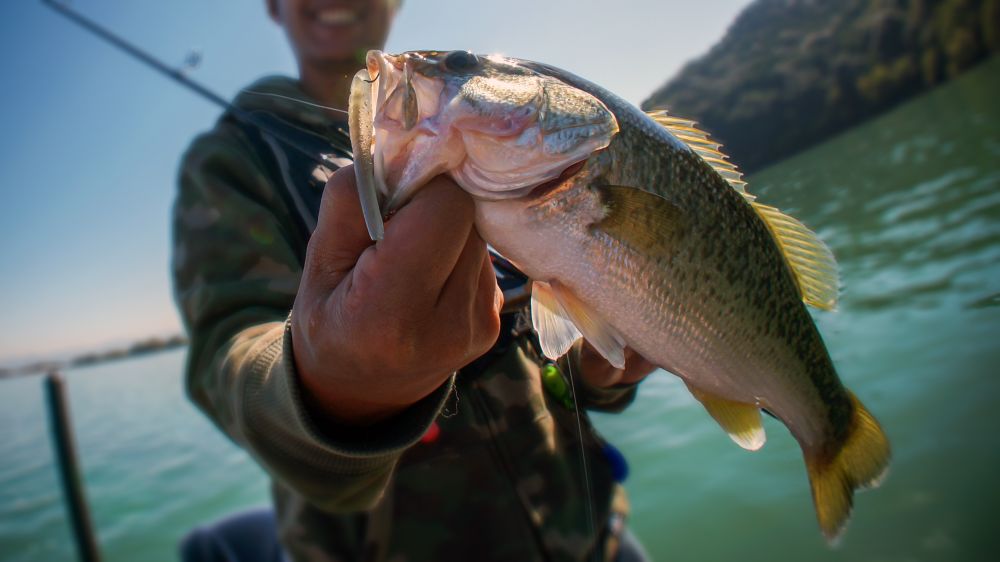
The Largemouth Black bass belongs to the Centrarchidae family. It has an average size of 50 to 70 cm for 4 kg. Its longevity is about 15 years. Spawning occurs from late spring to mid-summer. The number of eggs varies according to the size of the female, from 2000 to 14000 eggs. It is caught from March to October. Large-mouth black bass is a moderately large and robust fish. Its head is strong. Its terminal mouth is large, broad and oblique. The lower jaw is slightly prominent while the upper jaw extends to the back of the eye. The two dorsal fins are almost entirely separated. The first dorsal fin is rather low and has 10 spines. The second dorsal fin with a rounded shape is higher and has an average of 12 rays. Pelvic fins are short, rounded and have 1 spine and 5 soft rays. The pectoral fins are rather short, broad, rounded at the tip and have 13 to 15 rays. The dorsal side of the body varies from bright green to olive. The sides are pale green or golden green. There is a wide, uniform black lateral band that sometimes extends over the operculum and eye to the muzzle. The sides of the head vary from green to olive. The caudal is devoid of bright colors. The ventral side varies from milk white to yellow.
The Largemouth black bass is a famous fish you can catch in Dalestie.Our fishing forecast of Dalestie indicates the best time to go fishing in this city.
Our fishing forecast of Dalestie indicates the best time to go fishing in this city.
Our fishing forecast of Dalestie indicates the best time to go fishing in this city.
